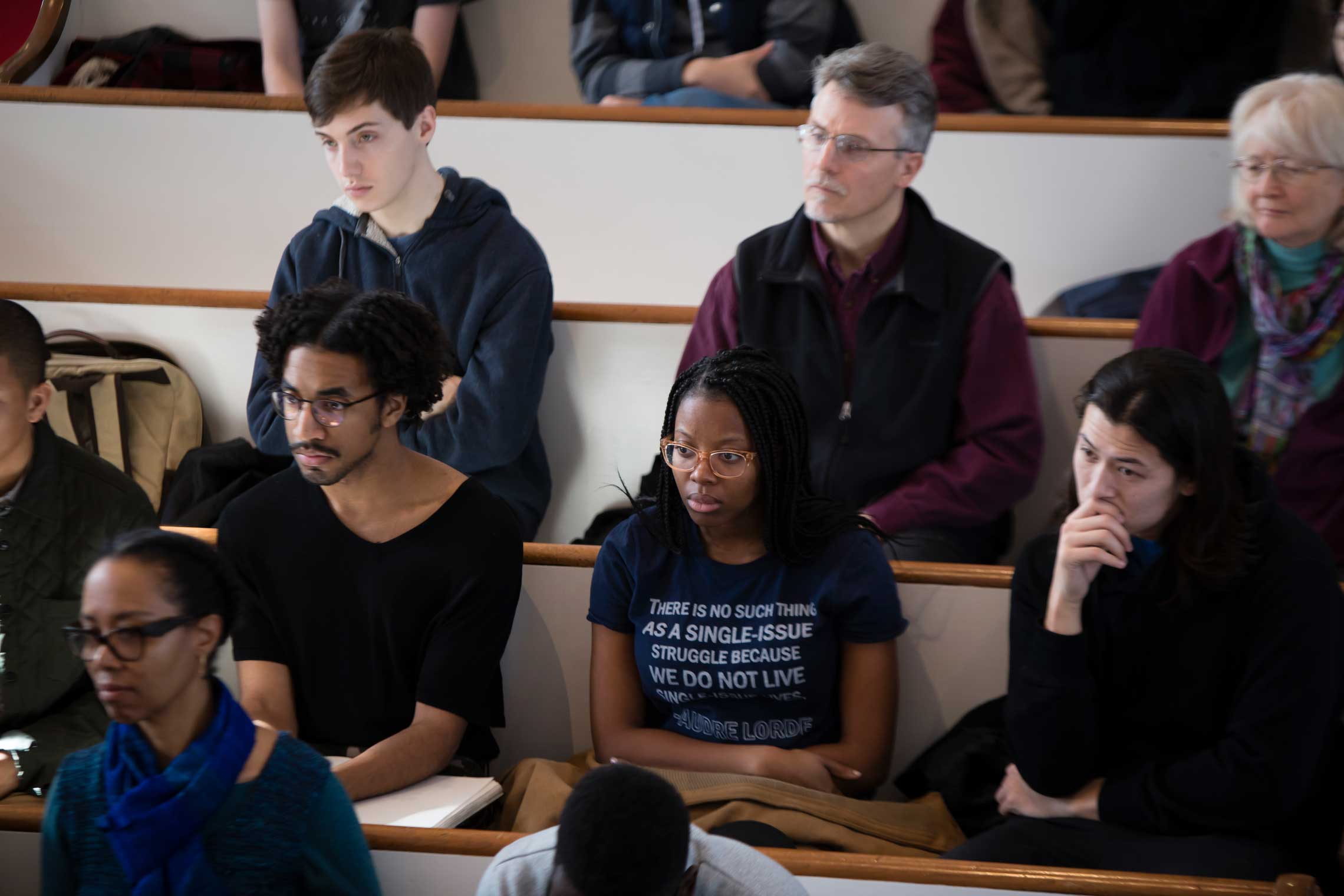Even before Sanchez took the stage, music filled the room. Storyteller extraordinaire Jean Moss (former associate dean of students at Amherst and the namesake behind the Moss Quantitative Center), began her introduction by singing. Yes, singing. (Hello, audience. Pay attention!)
What did she sing? Lines from “Can’t Give Up Now” by Mary Mary. She gestured towards Sanchez every time she changed the lyrics from “I” to “she,” hinting at the challenges Sanchez has faced in her life:
She’s come too far from where she started from
Nobody told her that the road would be easy
And she don't believe he brought her this far to leave her
Rather than list Sanchez’s many awards (the P.E.N. Writing Award, Langston Hughes Poetry Award, the Robert Frost Medal, Harper Lee Award, to name only a few), Moss focused on Sanchez’s personal hardships—the early death of her mother, early encounters with racial bias, being moved about to live with various relatives, overcoming a significant stutter. Moss, a self-proclaimed “call-and-response kind of woman” taught the audience a single line to sing inspired by Johnny Gill’s “My, My, My.” Throughout the introduction, whenever she pointed, we sang out our line in solidarity with Sanchez, acknowledging the difficulties she has faced, and the difficulties we each have faced.
“I tell you, storytellers can tell an introduction,” Sanchez said when she stepped up to the podium. “I mean you don’t know an introduction till you’ve been introduced by a storyteller.”
With that, the program began. “We’re here,” Sanchez said, “because we must answer the most important question we can ask: What does it mean to be human?...We’re here to make you remember King’s battle against ignorance, fascism, racial and social and economic oppression...We are here because Martin said ‘Now let us begin. Now let us rededicate ourselves to the long and bitter, but beautiful struggle, for a new world.’” The repetition of this refrain, which she returned to throughout her talk, lent a sense of urgency to her message.
Over the next hour, Sanchez implored us to think about how we would answer a question our children might one day ask: “What did you do when the poor suffered, and tenderness and life burnt out in them?“ Our answer, according to Sanchez, must be: we resisted. “Resist,” she said, “is an ancient word. A holy word. A church-going word. A womanist word. A political word. A freedom worker’s word.”
She urged students to form study groups, and to invite marginalized peers into those study groups. And she sang. (“Woke up this morning with my eyes on brother Martin. Woke up this morning with my eyes on brother Martin. Woke up with my eyes on brother Martin. Gonna live; gonna love; gonna resist, just like him.”)
Sanchez recommended that Amherst College—that every college—establish a “peace site,” where students could go and reflect when they are troubled. She urged all of us to write letters to Congress. To speak up and speak out. She dropped names—important ones: Derrick Bell. Maya Angelou. Alice Walker. June Jordan. Audre Lorde. And once again, she sang. (“Woke up this morning with my eyes on you. Woke up this morning with my eyes on you. Woke up this morning with my eyes on you.”)
At the end, Sonia Sanchez issued an assignment: “For one week, do not twist and curl your tongues and say anything negative about anyone. One week...and you will find your body becoming light, expelling that kind of terrible thing that we carry within us. The tongue that has destroyed organizations on this earth...That’s what we must do and be about.”
Why are we here? We’re here because Sonia Sanchez matters.
*This article has been corrected from the original to state that Sanchez was the second person to serve as chair of Black Studies, not the first.





